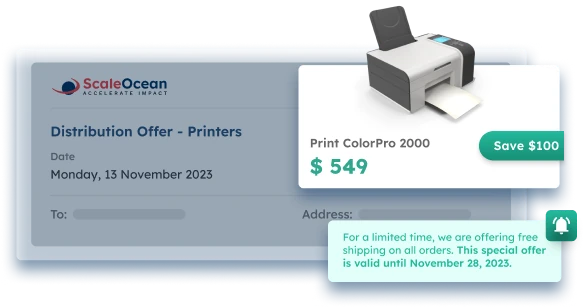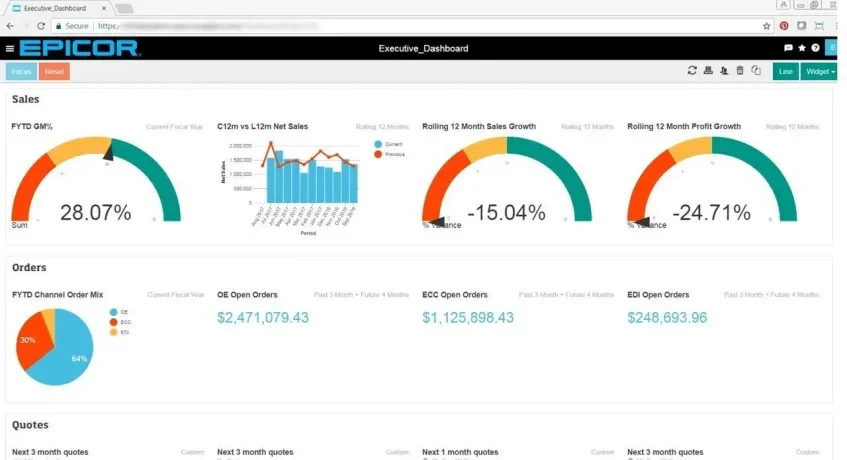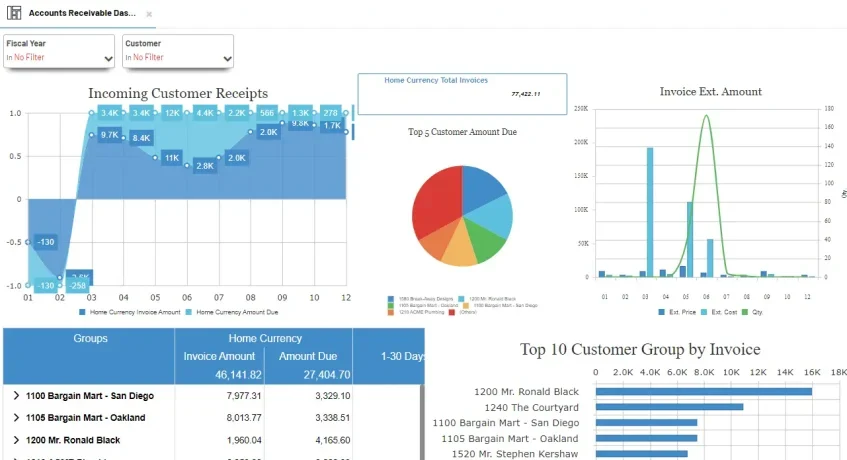Wholesale distribution in Singapore is a competitive field, which requires every advantage to stay ahead of the game. Managing complex operations is a big part of that challenge, where a lot can go wrong. An ERP for wholesale distribution can be the answer, integrating everything from inventory to sales.
According to IMDA, the Wholesale Trade Industry Digital Plan (IDP) is part of the SMEs Go Digital initiative, which assists enterprises in wholesale distribution in adopting digital solutions such as ERP systems to streamline operations, improve efficiency, and remain competitive in a demanding market.
This guide will look at the top distribution ERP software, such as ScaleOcean, Acumatica, NetSuite, SAP Business One, Microsoft Dynamics 365, Epicor, and SYSPRO. While these systems are well-known around the world, we’ll concentrate on the best local solutions for your specific business requirements.
- Distribution ERP software is tailored exclusively to the wholesale distribution business. It covers complicated activities such as inventory management across many warehouses
- Discover the best wholesale distribution ERP software for businesses in Singapore, including ScaleOcean, NetSuite, Epicor, Microsoft Dynamics 365, and more.
- Tips for researching distribution ERP systems to evaluate features, pricing, industry insights, and professional advice to find the best distribution ERP system for your business.
- With ScaleOcean’s ERP Distribution Software, you can overcome distribution challenges by integrating your operations and gaining the crucial insights needed for smart, sustainable growth.

What is Distribution ERP Software?
Distribution ERP software is tailored exclusively to the wholesale distribution business. It covers complicated activities such as inventory management across many warehouses and supply chains that generic ERP systems cannot handle successfully.
This software consolidates all fundamental processes on a single platform, serving as the central nervous system for your company. It assures seamless and effective operations from order intake to final delivery, which has a huge impact on your organization.
Key Features and Functions
A robust distribution ERP system provides a variety of functionalities to address issues in wholesale enterprises. These functions go beyond basic accounting and inventory management, offering options for streamlining processes and increasing productivity. The following are the important characteristics and functions to look for:
1. Inventory Warehouse Management
This is exactly where a good distribution ERP system truly shines, offering real-time visibility into your stock levels, which is a big deal. This functionality is key to avoiding those costly mistakes like stockouts or, just as bad, having too much inventory.
Plus, it usually handles multiple warehouse locations, tracking transfers between them without a hitch. The system can even automate replenishment processes, meaning you won’t often run out of those fast-moving items.
2. Order Processing
Efficient order processing is genuinely crucial, especially if you want to keep your customers happy and coming back. A solid distribution ERP system can pretty much automate the whole order-to-cash cycle, from that initial quote right through to final payment, which is a huge time-saver.
This automation really cuts down on manual errors and dramatically speeds up fulfillment times, which everyone appreciates. It manages complex pricing, discounts, and order types effortlessly, streamlining the process for your sales team and ensuring quick, accurate order processing.
3. Supply Chain Management
A strong distribution. ERP allows you to fully oversee your supply chain, from procurement to logistics. It improves visibility by allowing you to track shipments, manage lead times, and engage with suppliers from a single dashboard, improving business processes and responding to disruptions.
This is especially critical for businesses that need a robust ERP software for the food industry, where tracking and logistics are paramount. It ensures compliance and freshness from supplier to customer, which, as you can imagine, is absolutely vital.
4. Financial Management
Let’s be honest, strong financial management is the absolute backbone of any successful business, especially in wholesale distribution. A comprehensive distribution ERP will always include a full accounting suite, completely integrated with your daily operations.
What this means is every single transaction, from sales orders right through to purchase invoices, automatically shows up in your general ledger, which is super convenient. It offers a real-time view of your financial health, simplifying reporting, budgeting, and cash flow management.
5. Customer Relationship Management (CRM)
For long-term growth, building really strong customer relationships is, frankly, non-negotiable. It’s not uncommon to see many distribution ERP solutions now come with pretty robust built-in CRM functionality.
This feature lets you manage all your customer interactions from a single spot, making it easy to track sales activities, handle leads, and just provide genuinely better customer service. Having all this customer data integrated right alongside their order history provides your sales team with the insights they need to truly excel.
6. Sales and Purchasing
Sales and purchasing are, quite naturally, absolute core functions for any distributor, no matter the scale. An ERP system does a fantastic job of streamlining these processes by integrating them incredibly tightly, which just makes sense.
Your sales team gets to create quotes and orders with real-time access to inventory and pricing information, which is a game-changer. Meanwhile, your purchasing team can automate purchase order creation based on demand forecasts and reorder points, making sure you always have the right products at precisely the right time.
7. Analytics and Reporting
Making data-driven decisions is pretty much essential in today’s competitive market. There’s no way around it. A good distribution ERP software will offer really powerful analytics and reporting tools to help you do just that.
You can easily generate detailed reports on sales, inventory, and your financial performance, which is invaluable. Plus, dashboards offer a quick, high-level overview of all your key metrics, helping you spot trends and pinpoint areas for improvement, so this ability to analyze data becomes a major competitive advantage.
8. Unified Operations
Honestly, having all your operations managed within one single system is nothing short of a game-changer for a distribution business. It fundamentally breaks down those departmental silos that, let’s face it, often create inefficiencies.
When your sales, warehouse, and finance teams are all working from the same information, collaboration just naturally improves dramatically. This unified approach really ensures everyone is on the same page, which ultimately leads to much better decision-making across the entire organization.
9. Multi-Channel and Global Support
It’s common knowledge that many distributors today operate across multiple channels or even on a global scale. Thankfully, a modern ERP for a distribution business can totally support these complex business models.
Such a system can adeptly handle multiple currencies, languages, and all those varying tax regulations, which is a huge benefit. Whether you’re selling via e-commerce, direct sales, or through various retail partners, the ERP can manage it all, providing precisely the flexibility you need to expand your business reach.
How Distribution ERP Differs from Other ERPs
A distribution ERP differs from a generic ERP in that it is specifically designed to address industry-specific difficulties. While both have fundamental functions, a distribution ERP provides specialized tools for wholesale distribution, making it better suited to distributors’ specific needs. Here’s where they disagree:
1. Focus
The crucial difference is focus. While a generic ERP is suitable for manufacturing or services, it lacks the unique tools that distributors require. A distribution ERP, such as Singapore pharmaceutical distribution ERP software, is designed with the distributor’s workflow in mind, enhancing order management and supply chain visibility.
So, it’s definitely not just a generic, one-size-fits-all solution that you often see. Instead, it’s truly made to fit your specific industry’s challenges and how you do things, which is what you need from a dedicated distribution ERP system.
2. Core Operations
When you look at generic ERPs, they often really focus on things like manufacturing processes, bills of materials, or even shop floor control. But then, a distribution ERP it’s completely different because its focus is all about inventory movement and order fulfillment.
Things like advanced warehouse management, lot tracking, or even rebate management are just standard features in good wholesale distribution ERP software, but in other systems, they’re either extra add-ons or just completely missing sometimes. This focus on distribution operations makes it ideal for wholesalers to optimize their ERP.
Benefits of Distribution ERP Software
Implementing a distribution ERP system is a considerable step, but the rewards to your wholesale firm are substantial. It improves productivity, profitability, and customer happiness, enabling the development of a resilient, adaptable organization for long-term growth. Here are the major benefits of distribution ERP software:
1. Increased Efficiency
Honestly, one of the most immediate and significant gains you’ll see is just how much more efficient your daily operations get. By taking manual tasks like data entry and the whole order processing rigmarole off your team’s plates, you really free them up to do other things.
Your team members can then actually focus on the things that matter more, like providing excellent customer service or driving sales, rather than getting stuck in endless paperwork. This kind of automation genuinely delivers a significant boost in productivity for the entire distribution team, which is a welcome change for everyone.
2. Improved Customer Satisfaction
It’s pretty straightforward, really: happy customers tend to stick around and become loyal customers. A solid distribution ERP system can genuinely boost that satisfaction by making sure deliveries are both accurate and consistently on time, which is a big deal for any business.
Having real-time insight into what’s in stock and where orders stand means your team can actually give customers quick, spot-on answers to their questions, every single time. Responsive service builds trust and sets you apart, giving you a strong competitive advantage in distribution.
3. Reduced Costs
An ERP, especially one tailored for distribution, can surprisingly help you cut down on costs in quite a few areas. For instance, better inventory management alone means you’re reducing those carrying costs and really minimizing losses from any obsolete stock that just sits there, which is a major win for the budget.
Plus, when your procurement processes are all smoothed out, you’re actually in a position to snag early payment discounts and even negotiate much better terms with your suppliers. These kinds of savings, when you add them all up, can have a truly direct impact on your bottom line.
4. Better Visibility
It’s no secret that visibility is often a real sticking point for many distributors out there. An ERP system, specifically a distribution ERP, essentially becomes your single source of truth, giving you a truly complete and accurate look at your entire business operation.
This means you get real-time data on everything from your current inventory levels to how sales are actually performing. Such improved visibility truly lets you make much more informed, strategic decisions, taking a lot of the guesswork out of managing your operations day-to-day.
5. Enhanced Inventory Management
Now, we’ve definitely touched on this already, but it’s really something worth highlighting again. Enhanced inventory management is truly a game-changing benefit for any distribution business, and it deserves its own mention.
A good distribution ERP helps you fine-tune your stock levels, which means you’re reducing the annoying risk of both running out of products (stockouts) and having too much sitting around (overstocking). This balance helps meet customer demand without locking up cash in inventory, and an ERP manages it effectively.
6. Streamlined Sales and Order Processing
Let’s face it, a sales process that’s both faster and more accurate is a win for absolutely everyone involved. A distribution ERP system really smooths out that whole cycle, right from the initial quote all the way through to the final invoice, making it a much less clunky process.
What this practically means is that orders get processed way quicker, fulfillment becomes much more accurate, and billing happens right on time. This kind of efficiency doesn’t just improve your cash flow; it genuinely enhances the overall customer experience, which is vital for loyalty in wholesale distribution.
7. Optimized Procurement Processes
It’s a point often missed, but optimizing how you buy your goods is every bit as critical as how you sell them in distribution. A specialized distribution ERP really gives you the right tools to manage your entire procurement process much, much more effectively, which is a key area for cost control.
Within the system, you’re able to automate purchase orders, keep a close eye on how your suppliers are performing, and even manage all your contracts seamlessly. It ensures you get the best prices and terms from suppliers, making purchasing smarter.
8. Improved Logistics and Warehouse Operations
When you think about it, efficiency right there in the warehouse is absolutely critical for any ERP for a distribution business. A good ERP system can truly optimize everything, from how you receive and put away items to the entire picking, packing, and shipping process, making a huge difference in daily flow.
By really streamlining these workflows, you’re looking at reduced labor costs and a noticeable improvement in order accuracy. This, in turn, means faster fulfillment times and way fewer shipping errors, which is truly a win-win situation for both your company and your customers.
9. Robust Financial Management and Reporting
And finally, a distribution ERP also brings a robust financial management system to the table, offering a clear and up-to-date picture of your company’s financial health. According to MDDI, digitalization contributes $128 billion, or 18.6%, to Singapore’s GDP, highlighting its importance.
You’ll find it quite easy to generate all sorts of financial statements, handle both accounts receivable and payable, and even track profitability down to individual products or specific customers. This kind of deep financial control isn’t just nice to have. It’s essential for sustainable growth in the long run.
12 Best Wholesale Distribution ERP Software for Business Singapore
Choosing the best ERP for wholesale distribution in Singapore can be challenging due to the many options. Each system offers unique benefits, so the right choice depends on your firm’s size and industry, making a whole distribution ERP software crucial in the decision. Below is a list of the best wholesale distribution ERP software for Singapore businesses:
1. ScaleOcean ERP Distribution Software
One of the best ScaleOcean’s distribution ERP software smoothly integrates several business operations, such as warehouse management, finance, supply chain, and shipping. This integration ensures that operations run smoothly across all departments, allowing businesses to manage complex workflows more efficiently.
ScaleOcean also focuses on ensuring compliance with Singapore’s rigorous GST/IRAS rules. The program automates the quote-to-cash cycle by converting orders into invoices, which can then be connected with InvoiceNow, Singapore’s e-invoicing standard.
ScaleOcean also offers a free demo of its distribution ERP software, allowing firms to see its potential firsthand. This solution is intended to help wholesale distribution organizations streamline their processes, with the extra benefit of being eligible for Singapore’s CTC grant.
Key Features:
- Real-Time Inventory Management: Efficient stock tracking and updates across multiple locations.
- Streamlined Order Management: Automates and simplifies the order-to-cash cycle.
- Comprehensive Supply Chain and Logistics Management: Smooth coordination between departments.
- Robust Financial Management: Ensures compliance with GST/IRAS regulations and seamless e-invoicing integration.
- Advanced Reporting and Analytics: Provides insights into operations and drives data-driven decision-making.
| Pros | Cons |
|---|---|
|
|
Best For: ScaleOcean’s customizable and industry-ready solutions make it suitable for all industry sectors. Its multi-branch management capability enables centralized ERP management across all branches, resulting in a unified platform for efficient operations.
2. NetSuite Cloud Distribution ERP
NetSuite is a cloud-based ERP used by various businesses. It is often seen as a great fit for distributors, offering a very comprehensive suite of tools. You’ll find it quite useful for handling financials, inventory, and all your e-commerce needs, which is a big plus.
Its main strength is definitely its scalability, which makes it a really good choice for those businesses growing fast. NetSuite essentially gives you a unified platform where you can manage pretty much your entire operation from one place.
Key Features:
- Cloud-based ERP for real-time access
- Financial management and reporting tools
- Inventory management across multiple locations
- E-commerce integration
- Customizable dashboards for key metrics
| Pros | Cons |
|---|---|
|
|
Best For: Medium-sized to big enterprises seeking a scalable cloud-based ERP system with strong supply chain, inventory, and financial management capabilities across multiple industries should choose NetSuite.
3. Epicor Distribution ERP Software
Epicor has been around for a while, providing some great, industry-specific ERP solutions, and its distribution software is known for being reliable and configurable. This tends to be a good thing for businesses that need something really tailored.
It offers strong capabilities across warehouse management, supply chain, and business analytics, which is crucial for insights. Epicor is often a great option for distributors who are dealing with complex operational needs, as it can handle quite a bit.
Key Features:
- Industry-specific ERP solutions
- Strong warehouse management capabilities
- Business intelligence and analytics tools
- Integrated supply chain management
- Customizable for various operational needs
| Pros | Cons |
|---|---|
|
|
Best For: Epicor’s robust warehouse management and supply chain optimization capabilities make it the perfect choice for companies in the manufacturing and distribution industries that require a flexible ERP system to handle intricate operations.
4. Microsoft Dynamics 365 Distribution ERP Platform
Microsoft Dynamics 365 brings together both ERP and CRM functions onto just one cloud-based platform, which is pretty handy. It’s quite well-known for its flexibility and how smoothly it integrates with other Microsoft products, a benefit for many.
For those in distribution, it provides strong, useful modules for both supply chain management and finance, which are always key areas. Its general familiarity, especially if you’re already in the Microsoft ecosystem, makes it an easy choice for many.
Key Features:
- Integration of ERP and CRM functionalities
- Financial management and reporting tools
- Supply chain management modules
- Flexible cloud-based platform
- Integration with other Microsoft products
| Pros | Cons |
|---|---|
|
|
Best For: With its robust financial, sales, and supply chain management features, Microsoft Dynamics 365 is a well-suited ERP and CRM solution for companies of all sizes that already use Microsoft products.
5. Sage Distribution System
Sage actually has several ERP products available, and they really do cater to all sorts of business sizes. Specifically, Sage X3 tends to be a good fit for mid-sized distributors, offering features that align well with their operations.
It brings strong functionality for things like inventory management, purchasing, and sales, which are essential for any distribution business. What Sage is really known for, though, is its deep financial capabilities, which can be a huge asset.
Key Features:
- Advanced financial management tools
- Strong inventory and warehouse management
- Supply chain and procurement management
- Multi-currency and multi-language capabilities
- Cloud and on-premise deployment options
| Pros | Cons |
|---|---|
|
|
Best For: Sage X3 is ideal for mid-sized firms in distribution, manufacturing, and other industries seeking an ERP solution with robust financial and inventory management capabilities.
6. Acumatica Cloud ERP for Wholesale Distribution
Acumatica is a modern, cloud-based ERP, and it really puts a lot of focus on usability, making it easier to work with. They even offer a dedicated distribution edition, which comes packed with a pretty wide range of features specific to the industry.
Acumatica’s model is based on resource consumption rather than the number of users, which may suit businesses with changing needs. Ultimately, it’s just a very flexible solution, allowing for quite a bit of adaptation.
Key Features:
- Cloud-based ERP with mobile access
- Real-time financial reporting
- Inventory and warehouse management
- Project management and resource planning
- Resource consumption-based pricing model
| Pros | Cons |
|---|---|
|
|
Best For: With an emphasis on usability and real-time financial, inventory, and project management, Acumatica is the perfect cloud-based ERP system for small to mid-sized organizations.
7. SAP Business One ERP Distribution Solution
SAP Business One is another popular ERP, particularly well-regarded for smaller and mid-sized businesses. It comes with some good capabilities for distribution, including how it handles inventory and production management.
It’s a comprehensive kind of solution, too, which means you can deploy it either right there on-premise or up in the cloud, whatever suits your setup. Overall, SAP provides a platform for managing business operations that is widely used in various industries.
Key Features:
- Financial and accounting management
- Inventory and supply chain management
- Production and manufacturing integration
- Sales and customer relationship management
- Cloud and on-premise deployment options
| Pros | Cons |
|---|---|
|
|
Best For: With both cloud and on-premise deployment options, SAP Business One is a good fit for small to mid-sized businesses looking for a complete ERP solution to manage production, inventory, and finances.
8. Dynamics 365 Business Central Distribution Solution
Dynamics 365 Business Central is another offering from Microsoft’s ERP line, specifically aimed at small and medium-sized businesses, which is a good focus. It’s pretty much an all-in-one business management solution, trying to cover most of what you’d need.
You get some good tools here for managing financials, sales, and your whole supply chain, all important pieces. Its integration within the larger Microsoft ecosystem is considered a notable feature by many users.
Key Features:
- Cloud-based ERP solution
- Financial and inventory management
- Sales and customer service integration
- Supply chain management
- Seamless integration with Microsoft Office products
| Pros | Cons |
|---|---|
|
|
Best For: Dynamics 365 Business Central is ideal for small to medium-sized enterprises looking for a cloud-based ERP that has robust financial, inventory, and sales management capabilities.
9. SYSPRO ERP Distribution Solution
SYSPRO is an ERP solution that’s particularly strong when it comes to the manufacturing and distribution sectors, which is where it really shines. It offers quite a wide range of modules, helping you manage almost every part of your business operations.
It’s well-known for having really deep, industry-specific functionality and for how much it focuses on helping businesses get their supply chains optimized. Essentially, SYSPRO is a specialized tool that can be useful for managing complex operations.
Key Features:
- Industry-specific ERP solutions for manufacturing and distribution
- Advanced inventory and supply chain management
- Financial and reporting tools
- Business intelligence and analytics
- Multi-currency and multi-language support
| Pros | Cons |
|---|---|
|
|
Best For: SYSPRO is ideal for manufacturing and distribution organizations that demand a highly customized ERP system with robust supply chain and inventory management capabilities.
10. Infor CloudSuite ERP Solutions
Infor has a knack for offering industry-specific cloud ERP solutions, and its CloudSuite distribution is a platform designed to support distribution operations. It’s clearly designed to help distributors modernize their operations, bringing things up to speed for today’s market.
You’ll find great capabilities here in areas like analytics, inventory management, and even customer relationship management, which are all vital. It’s truly built with the modern distributor in mind, anticipating current and future needs.
Key Features:
- Cloud-based ERP for distribution operations
- Analytics and business intelligence tools
- Inventory and warehouse management
- Customer relationship management features
- Industry-specific solutions for distribution
| Pros | Cons |
|---|---|
|
|
Best For: Businesses in the distribution sector who need a cloud-based ERP with robust analytics, inventory control, and CRM features that are tailored to the sector can choose Infor CloudSuite.
11. SAP S/4HANA ERP for Distribution Business
For those really large enterprises out there, SAP S/4HANA stands out as one of the leading ERP solutions. It’s a powerful platform, leveraging in-memory computing, which allows for real-time analytics and quicker decision-making.
It offers comprehensive capabilities for managing every single aspect of a large distribution business. Honestly, SAP S/4HANA is commonly chosen for complex, global operations due to its comprehensive features.
Key Features:
- In-memory computing for real-time analytics
- Comprehensive ERP for large enterprises
- Integrated supply chain and logistics management
- Financial and accounting management tools
- Cloud and on-premise deployment options
| Pros | Cons |
|---|---|
|
|
Best For: With real-time analytics, extensive business management tools, and the scalability required to manage extensive distribution and supply chain operations, SAP S/4HANA is perfect for large organizations with intricate, international operations.
12. Oracle Cloud Enterprise Resource Planning Distribution Platform
Oracle’s Cloud ERP is one of the great solutions, generally for larger businesses looking for something robust. It brings a complete suite of applications for finance, procurement, and even project management.
With its analytics and artificial intelligence capabilities, businesses can make more informed decisions, which can be beneficial in today’s environment. Ultimately, it’s a comprehensive, future-focused platform, really geared towards what’s next.
Key Features:
- Cloud-based ERP for large enterprises
- Advanced financial and procurement management
- Business analytics and artificial intelligence tools
- Supply chain and logistics management
- Integrated project management features
| Pros | Cons |
|---|---|
|
|
Best For: With scalability and flexibility for future expansion, Oracle Cloud ERP is ideally suited for large businesses in need of an all-inclusive ERP system with sophisticated analytics, financial management, and supply chain capabilities.

Tips for Researching and Comparing Distribution ERP Systems
When choosing an ERP for distribution, it is critical to locate one that matches your business operations and objectives. An organized strategy will simplify the selection process and save future hassles. Here are some tips to help you research and compare distribution ERP systems:
1. Gain Insights from Real Distribution Businesses in Singapore
It’s always a smart move to actually talk to other distributors, especially those in Singapore, who are already using an ERP for wholesale distribution. Their firsthand, real-world experience is incredibly valuable, often much more so than anything a sales pitch might tell you.
When you chat with them, make sure to ask about the challenges they hit during implementation and what they genuinely like or perhaps dislike about their current setup. Real-world insights can help you avoid pitfalls and make a more informed decision for your distribution ERP needs.
2. Begin with Feature Evaluations
Kick things off by creating a solid list of the absolute must-have features for your business, particularly when considering a new ERP for wholesale distribution. Really consider your biggest operational challenges and then actively seek out an ERP that can directly solve those for you.
It’s easy to get sidetracked by all those flashy features you’ll likely never even touch, so try not to let that happen. Instead, put your focus squarely on the core functionalities that promise to deliver the biggest impact on your efficiency and profitability. This approach helps you create a clear evaluation checklist for your ERP search.
3. Obtain Precise Pricing Details
ERP pricing models, especially for a comprehensive distribution ERP system, can sometimes feel a bit like a maze, so it’s super important to nail down a really clear and detailed quote from every vendor you’re considering. Make sure you ask specifically about licensing fees, implementation costs, and any ongoing support and maintenance fees.
You absolutely need to ensure there won’t be any hidden costs popping up later that could catch you by surprise, because those are never fun. Honestly, a transparent pricing model is usually a very good sign of a trustworthy vendor, someone you can feel confident doing business with for your distribution ERP solution.
4. Utilize Industry Research
Don’t forget to dig into those industry reports and reviews, maybe from well-known sources like Gartner or Forrester. These often give you a really solid, unbiased overview of the leading ERP vendors and where their particular strengths lie, which is quite helpful for any distribution business.
All this research can really help you put together a solid shortlist of potential ERP candidates, saving you time later on. It essentially provides a fantastic starting point and helps you get a much better handle on the current market landscape for wholesale distribution ERP systems.
5. Receive Professional Advice
Seriously, don’t ever be afraid to seek out some advice from an independent ERP consultant. It’s a worthwhile investment for any business considering a new distribution ERP. These professionals bring a ton of expertise, helping you really navigate the whole selection process and giving you that much-needed objective perspective.
A good consultant can assist you in so many ways, from really pinning down your specific requirements to helping you evaluate various vendors and even negotiating contracts on your behalf. Honestly, their guidance during this complex journey can be incredibly valuable, potentially saving you both time and money in the long run.
6. Conduct a system demo with a distribution ERP vendor
Please, whatever you do, never commit to an ERP system, especially an ERP for wholesale distribution, without actually seeing it in action first. You should absolutely schedule a personalized demo with each of your shortlisted vendors.
When you do the demo, make sure to give them some of your actual, real-world business scenarios to see exactly how their system handles them. This is where the rubber meets the road. It’s the best way to assess if the software fits your team and distribution needs.
Conclusion
Choosing the appropriate ERP is critical for every wholesale distribution company. A distribution-specific ERP system has considerable advantages over generic software because it streamlines processes from inventory to sales while offering visibility and control to support expansion.
To address these requirements, ScaleOcean provides a distribution ERP system that streamlines operations, improves customer connections, and supports long-term growth. As a vendor, ScaleOcean offers a free demo, allowing organizations to see the benefits for themselves.
FAQ:
1. What is distribution in ERP?
Distribution in ERP involves managing the flow of products within the supply chain, from suppliers to customers. This includes tasks like inventory control, order processing, and delivery, ensuring efficient movement of goods throughout the process.
2. What is an ERP system in a warehouse?
An ERP system in a warehouse integrates processes like inventory tracking, order fulfillment, and shipping. It provides real-time stock updates, automates tasks, and improves operational efficiency, optimizing warehouse management.
3. What are examples of ERP software?
Examples of ERP software include SAP, Oracle ERP, Microsoft Dynamics, and ScaleOcean. These platforms integrate key business functions, such as finance, human resources, and inventory management, to streamline operations and improve efficiency.
4. What is the difference between retail and wholesale distribution?
Retail distribution involves selling directly to consumers through stores or online platforms. Wholesale distribution, on the other hand, sells products in bulk to retailers, who then distribute them to end consumers. The main difference is the target market and transaction volume.














 PTE LTD..png)
.png)

.png)








.png)
.png)
















